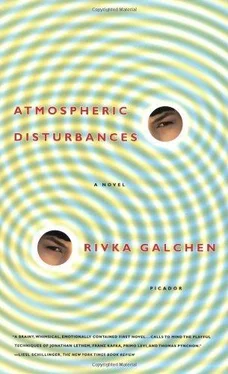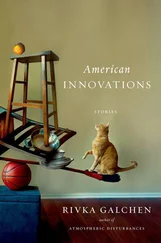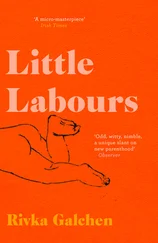He was sitting near the gas hearth in a low, broad upholstered chair, his legs delicately crossed, his girlishly narrow ankles displaying wiry black hairs against paleness. He was wearing his suspenders over a sweater, with the cuffs and collars of two button-up shirts extending from beneath. He appeared occupied with his pocket mirror, seemed not to have noticed me.
I folded up my newspaper. This left the obituaries section facing out. Which seemed distasteful. And which reminded me of Tzvi. So I then unfolded and refolded the paper.
By which time Harvey had risen from his chair and crossed over to me; in response I rose too. He took hold of my entire forearm, gave it a firm, formal shake. I heard him say, “I thought I’d be more on your mind.”
And yes I did feel like we both had unusually long arms, that our shake might have been observed in a zoo. “Wow. What?” I said.
“I’ve had so far,” Harvey said, “a marvelous, marvelous time.”
“Do you think,” I said, stuck on his opening, “that I should have been more worried about you?”
He gestured that I take a seat. “Why are you asking me that, Dr. Leo?”
And I’d wanted to dismiss that conversation we’d begun, but then it was that feeling of some corpuscle of my bone marrow, some meek, undernourished corpuscle, taking the stand at the pulpit of my brain stem. “Do you think,” came out of me in a whisper, and yes, I’d taken that seat, “that, if I really cared for you, I would have taken out an advertisement in the paper?”
Harvey sat down as well, then leaned forward conspiratorially. “Why would you take out an”—and here he stressed the second syllable—“advertisement?” He also made a short vowel of the long “i” of the third syllable, which made him sound very affected — which made him sound very like himself — and which also I recognized as a move to gain ascendancy over me, as if I’d spoken incorrectly, or in a low-class way. “What,” he went on, “would the advertisement have said?”
I laughed loudly, to dispel any sense that I had been asking in earnest. Why had I said that? The thought of publicly declaring something, or even more specifically, of placing an ad in the paper — it was so strange to me, an intrusion, like how whenever I find myself near a high hedge the phrase the secret life of dogs pops into my mind, uninvited yet fully formed. Should I have taken out an ad looking for Rema? Was that the thought, cheaply costumed in generality, that I was really having? Did I think it halfhearted that I was looking for Rema all by myself? Perhaps it was that the image had partially risen again, as it does too often, of my mother looking through the newspaper classifieds. For notification of what? Of someone looking for her? Surely I had been misunderstanding. She always searched the paper so seriously, furrowing her brow just so, pursing her lips just so, and I would think — when I would see that — that maybe she was just terribly stupid. Or perhaps I was thinking of another echo of an advertisement in the paper, which is that a foolish friend once said to me, You could place an ad in the paper, looking for your father . One of the ugliest, stupidest things I’d ever heard anyone say. I wasn’t looking for my father. I had no need to see him or speak to him or know where he was or what he was or wasn’t wearing. Really, I barely remembered him, and I had no reason to believe that he was a particularly interesting or intelligent or good-looking man. (I can only surmise that it was the influence of the setting — the Patagonia of the unconscious that Rema had instilled in me — that prompted me to such banal and family-centered self-inquiry.)
“Yes,” I answered finally. “What would an advertisement say?” I felt like I was delivering a line in a play. “What a silly question!” I gave out one punctuating guffaw, then imagined the newspaper issue, once a seeming bedrock, suddenly revealed to be just wrinkled butcher paper, now hole-punched, the resultant confetti fallen and swept under a chair.
I pulled my chair slightly closer to the hearth.
Harvey followed suit.
“I heard,” Harvey said very quietly, “about your life, Dr. Leo. I wanted to express my condolences.”
“There’s absolutely nothing wrong with my life.”
“Your wife , Dr. Leo. I heard. About what happened to her.”
“But that’s my private business, Harvey. That’s not your affair. Who said what to you when?” When I tried to think whom I might have told about the doppelganger, I just saw in my mind an impassably thick hedge. Then a me, emerging out of a hedge, a double of me, speaking words and acting acts for which I was to be held accountable. Instead of recalling anything useful I heard the laughter of that night nurse.
“Dr. Gal-Chen,” Harvey said, “told me.”
“You mean Rema?”
“I mean Tzvi Gal-Chen.”
“I suppose I did tell him.” Though I hadn’t explicitly asked Dr. Gal-Chen to treat my communications as confidential, I still felt, briefly, betrayed.
“And Dr. Gal-Chen told me.”
“He told you?”
“Yes, he mentioned it. Also mentioned that you were here. Also that he was concerned for you. I didn’t think it was a secret.”
“Oh. Oh, yes, good. Of course. No. No, I certainly don’t have any secrets.”
“And I wanted to express my condolences. I wanted to tell you that I’d like to be of help to you in any way that I can.”
4. Recent advances in epistemology
Of course he also wanted help from me. Harvey asked if he could share my room. He said he was out of cash. Naturally I accommodated; I couldn’t imagine any unpleasant consequences, and, honestly, I felt obliged toward Harvey, as if I had abandoned him, as if it weren’t he who had taken flight, or as if it had been my failures that had sent him away. Or maybe as if, obscurely, he were Rema. Who I was no longer, through some boyish idea of adventure, able to not miss.
“Your wife,” Harvey said, settling himself onto my (temporary) bed. “I wonder how she’s involved. What do you think the 49 Quantum Fathers are after? The whole journey here I couldn’t sleep because I was worried they were going after the sheep; that’s what you always hear about, Patagonian lamb; you don’t think they’d go after live animals like that, do you? That would be unprecedented. Maybe it’s just the fruit trees. I bet if you upped the winds on the pampa, not even that much, you could probably destroy all the fruit tree crops in one blustery evening. Cherries, peaches, apples — all smashed to the field of battle. Acres and acres covered in soft fruit flesh, just left to rot. Is your wife the silent, stoic type, or do you think this kind of thing might break her will? I’m sorry, I shouldn’t have asked that. What’s your current plan of action?”
Watching Harvey talk, I was reminded of a famous psychiatric case from the time of the French Revolution. A distinguished London tea merchant believed that a sinister “air loom gang” that controlled minds through mesmerism had foiled the peace he almost brokered with France. The merchant was placed in the asylum at Bedlam but in the end it proved true that the merchant was held there primarily at the request of a politician rather than for any medically indicated reasons. The details of the merchant’s story were off — there was no air loom gang — but the heart of what he had been saying had a kind of truth to it. He had been lobbying for peace. What I mean to say: Harvey was an acceptable ally, despite everything. And Rema had always been fond of him.
I mentioned to Harvey (without divulging my pseudonym) that I–I and not we — was to begin a job for the Royal Academy that very Monday. That was my plan.
Читать дальше
Конец ознакомительного отрывка
Купить книгу












